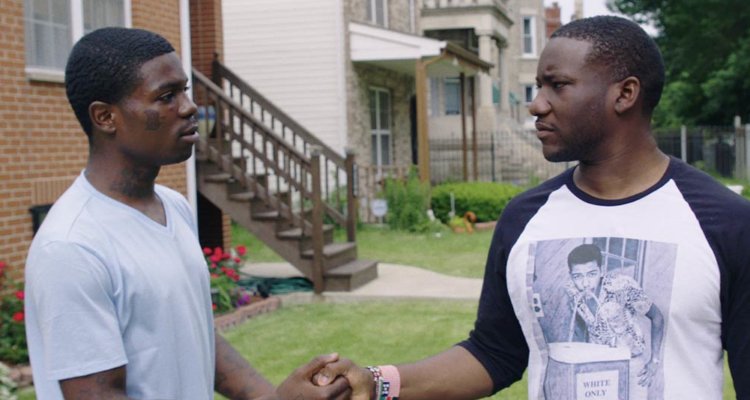Coming off their acclaimed documentary “Minding the Gap,” Joshua Altman and Bing Liu co-direct the searing, bracingly honest “All These Sons.” A Chicago-set documentary, the pair chart the strategies used by local black, West and South Side leaders to stop gun violence. In the 88-minute film, the filmmakers settle their lens on the IMAN (Inner-City Muslim Action Network) Community Center and the MAAFA Redemption Program located at New Mt Pilgrim MB Church. The two groups are taking in former gang members, young men who are the victims of gun violence themselves, and giving them the tools and social programs needed to alter their lives.
READ MORE: 2021 Tribeca Film Festival Preview: 15 Must-See Films To Watch & More
These alterations, however, do not come easy—making “All These Sons” so unflinchingly candid. Rather we see young men like Zay Manning and Shamont Slaughter struggle to turn their lives around. Not through lack of effort. But due to the systematic winds that cut through their ambitions like a Chicago winter’s gust. Altman and Liu’s empathetic “All These Sons” takes a much-talked-about Chicago-ailment, the city’s rampant and historic gun violence, and humanizes two communities who are so often dehumanized.
READ MORE: Summer 2021 Preview: Over 50 Movies To Watch
While Chicago documentary filmmaking will always be synonymous with “Hoop Dreams”-director Steve James, Altman and Liu are beginning to craft a strikingly unique track record. Set in the Illinois town of Rockford, “Minding the Gap,” for instance, was a personal story for Liu that recorded his skateboarding friends and their problems with fatherhood, generational and spousal abuse, alcoholism, and racism. With that in mind, “All These Sons” was never going to hit as close to home as “Minding the Gap”—Liu captured his friends, his community, and his mother in such a beautifully unvarnished manner—and yet, one can tell this intimate film was shot by a Chicago filmmaker.
READ MORE: The 100 Most Anticipated Films Of 2021
In “All These Sons,” Liu and Altman embed themselves on both the South and West side. The two leaders they primarily follow are Marshall Hatch Jr and Billy Moore. The pair come from starkly different backgrounds: Hatch Jr is a college graduate and the son of Marshal Hatch Sr, the pastor of New Mt Pilgrim MB Church. Moore, on the other hand, is most infamous as the murderer of local Simeon High School basketball star Ben Wilson. They represent distinct shades of the West and South side: the importance of the church in the black community and the necessity for redemption and forgiveness.
READ MORE: The Best Documentaries Of The Decade [2010s]
These leaders are desperately working to help the city’s young black men. But the task isn’t simple. Both Slaughter and Manning, two subjects we learn the most from, both suffer from PTSD and are emblematic of the systematic travails their areas heap upon them. Both have been shot, have experienced gut-wrenching loss, and have an anger inside of them that so often boils over. Not because they’re inherently dangerous people. Liu and Altman are too smart to flatten them. Rather the years of learned behavior, which must be unlearned, a lifetime of an unsupportive city, and the daily looming threat of death have pitched them into seemingly unbreakable cycles.
READ MORE: ‘Minding The Gap’ & The 20 Best Documentaries Of 2018
In “All These Sons,” however, there’s rarely hopelessness. Frustration does abound as Hatch Jr and Moore try their best to save Marshall, Slaughter, and the other young men. The pair plan respective trips to Washington D.C., recommend therapy, install GED programs, and the always supportive Moore shares his individual struggles. But these olive branches pale in comparison to the specter of distrust. Not against them. But against anyone. Slaughter, in particular, is quick to disavow any need for help. When asked if he’s ever sought therapy, for example, he retorts that he’s from the West Side. That is, he’s not worthy of it. His suspicions come on the back of generational wariness whereby the institutions meant to assist: the police, hospitals, and schools—have often betrayed.
Despite the heavy subject matter, “All These Sons” isn’t a totally dour film. Liu and Altman capture the beauty of Chicago’s oft-maligned black neighborhoods. A Fourth of July celebration, for instance, erupts into a lyrical tapestry of heartwarming fireworks, ebullient dancing, tasty barbecues, and pure celebration as the milky blue Chicago sky and strains of horns color the poetic moment. Another sees these young men traveling to Washington D.C. Their wide-eyed excitement, their voracious curiosity, and real togetherness absolutely warms the spirit, reminding us how even in the darkness, these men are filled with light.
While some specificity is missing from “All These Sons,” for a film set in two distinct religious spaces, it’s surprisingly secular with regards to IMAN. And the historical context: the decades of police abuse, is a bit on the light side. A fitting follow-up to “Minding the Gap,” Liu and Altman’s “All These Sons” is a sharp, deeply personal piece, equal parts devastating and inspirational. [B+]
Follow along with all our 2021 Tribeca Film Festival coverage here.

